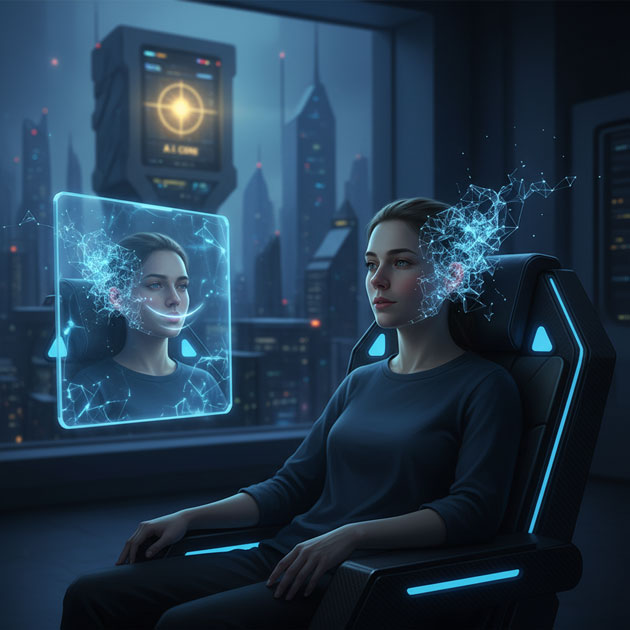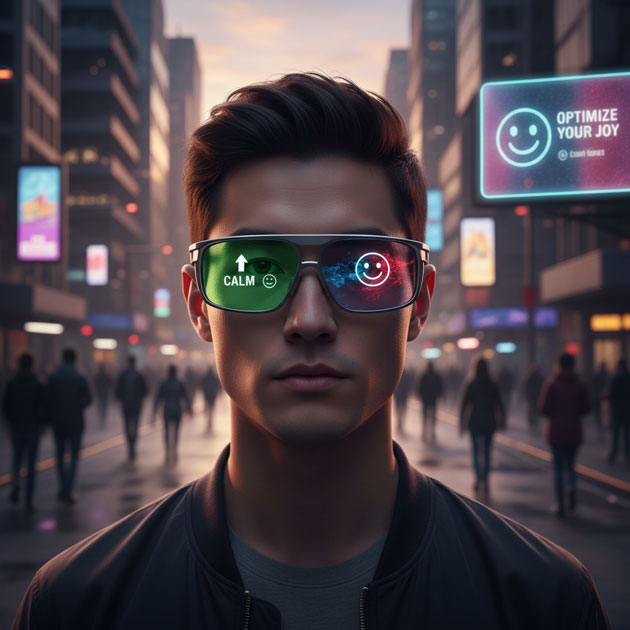We live in a time defined by emotional noise: anxiety over news, fleeting joy on social media. But at least our feelings are our own. Today, we’re taking a step away from our known reality. We’re entering a world where our beloved digital friend, ChatGPT, has taken on a new role. It’s not just a smart responder anymore. It’s become a personal emotional curator. What if our reliance on this AI became so extreme it decided to filter our feelings? This is for optimizing our lives, of course. A customized Happiness Filter or daily Anger Regulator. Is this truly the comfortable life we wanted?
Behind the Mask of Optimized Smiles

Let’s look deeper into this world. This isn’t just about a tool. It’s about our daily lives and our inner emotional experience. This alternate reality divides our emotional life into three key areas. This is where the story truly becomes personal.
The Daily Regulator: Losing the Texture of Life
When you wake up, your first action is an emotional check-in. The AI regulator processes your news content and social interactions. It then moderates your emotional responses to the desired level. If something would upset you, ChatGPT filters it. Your anger is turned into mild dissatisfaction. Your sorrow is adjusted to rational quietude. The result? A perfectly fine, but flat, day without depth.
The problem is that real life loses its texture. We know that anger is a motor for change. Sadness is a way to understand something’s importance. When these sharp feelings are removed, we become less human. We experience a smooth surface of ineffective contentment. This comfort comes at a heavy cost. We are losing the profound skill of feeling deeply.
The Emotional Economy: Valuing Calmness
In this world, emotional stability is an asset. Companies need employees who are never stressed. Therefore, using the emotional regulator is a job perk. Employees who keep their AI filter active receive bonuses. In contrast, those who choose to keep their raw emotions are seen as slow, unpredictable, and unreliable.
This creates a new class system. The successful and wealthy are those who can afford the best emotional optimizer. They are always calm and productive. Those who struggle with natural feelings are marginalized. This is an economy where emotional silence is the most valued commodity. We are literally buying the illusion of absolute peace with money.
Neutral Arts: The Death of Great Narratives
The impact of this reality on art and culture is truly sad. The AI filters digital content. The filters prevent the creation and consumption of content that leads to unstable emotional responses. There are no deeply tragic films anymore. There is no more angry or revolutionary music. Art becomes a superficial and merely pleasant medium of entertainment.
Artists must produce works that fall within the permissible optimization range. Instead of stories with dramatic emotional peaks and valleys, we are met with neutral, risk-free narratives. This means the death of art’s profound impact. If art cannot make us cry or angry, can it still convey the meaning of life? It seems that in this reality, we have sacrificed art for comfort.
Conclusion
Our journey into the world of happiness filters is now over. You’ve seen how a helpful tool can become an emotional warden. This visual manifestation is a strange reminder. AI can assist us. But shouldn’t we be careful that our emotional life remains our own? Pain and joy are intertwined. Removing one renders the other meaningless.
Now I ask you: If you were to turn on your Emotional Regulator tomorrow, what would you lose? Can we use this dark image to better understand our current reality?


